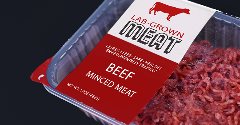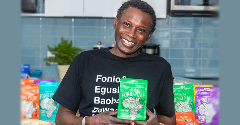News
Canadians believe snacking is better than three meals/day
1 Feb 2019It seems the traditional three meals a day are facing an evolution in Canada, as new research from Mintel reveals that nearly half (46%) of better-for-you (BFY) snackers feel that it is healthier to snack throughout the day than to eat three large meals.

It seems the traditional three meals a day are facing an evolution in Canada, as new research from Mintel reveals that nearly half (46%) of better-for-you (BFY) snackers feel that it is healthier to snack throughout the day than to eat three large meals. In need of constant fuel, many Canadians have snacks at the ready with two-thirds (65%) of BFY snackers believing it’s important to always keep healthy snacks on hand.
Keeping up with their interest in snacking throughout the day, more than half (51%) of Canadians agree that they’d like to see more healthy snacks packaged for eating on the go. What’s more, it seems there’s potential for anything to be considered a snack among younger consumers, as 45% of Canadians aged 18-24 are interested in snack-sized portions of regular foods as compared to 31% overall.“Snackers today are looking for ways to satisfy cravings that fit in easily with an increasingly on-the-go lifestyle. The good news is food manufacturers and foodservice providers need not start from scratch. As many consumers have adopted the notion that anything can be a snack, companies can appeal to those looking for better-for-you snacks by rethinking packaging to make items more portable rather than reinventing the wheel. This is especially crucial for foodservice vendors in particular as consumers aged 18-24 are the most likely to dine out, yet also feel the financial impact of it. This highlights an opportunity to offer smaller serving sizes of their dishes at lower price points to appeal to this group,” said Carol Wong-Li, Associate Director, Lifestyles and Leisure Reports, at Mintel.As consumers look to make better choices for themselves, it seems fresh and less processed snacks are coming out on top as fresh fruit and vegetables (84%) are the nation’s top better-for-you snack of choice, followed by cheese (79%), nuts (69%) and popcorn (60%). In fact, Mintel research shows the snack innovation that consumers are most likely to say they would like to see more of is products made from fresh ingredients (55%).While fresh snacks are winning out, younger consumers are placing power in protein to keep them full. Three in 10 (30%) consumers say they eat meat snacks, with younger snackers aged 18-34 the most likely age group to agree (41%). Although just 16% of consumers say they are interested in snack bars made with meat, one third (32%) of men aged 18-34 are keen to see more of this type of offering.Following the growing flexitarian movement, it seems that plant-based has potential when it comes to better-for-you snacking as three in 10 (29%) consumers say they are interested in snacks made with plant-based protein, rising to four in 10 (39%) among women aged 18-34.“Protein is a key area of interest for younger Canadians when it comes to innovations in healthy snacks, but men and women differ when it comes to the actual source of protein they prefer. While young women show interest in plant-based proteins, men are more likely to turn to meat. This may stem, in part, to the different approaches taken to snacking. Younger women tend to snack because they are too busy to eat meals, whereas young men usually do so as a way to refuel after exercise. Marketers looking to promote plant-based proteins will see success by focusing on how these ingredients work to keep consumers fuller longer, while brands promoting meat can focus on how the quality of the meat protein contributes to muscle building, recovery and/or development,” said Wong-Li.While Canadians are keen to enjoy healthy snacks, there are significant concerns. Nearly three-quarters (73%) of BFY snackers believe that many snacks marketed as healthy are not actually healthy, with just 41% saying they trust the health claims on food and beverage packaging. And for many, there’s confusion when it comes to making a healthy snack choice, as half (49%) say it is hard to tell if a snack is healthy.“Many consumers today have difficulty determining the healthfulness of snacks and hold a general distrust of claims on food and beverage packaging. This may be drawing them toward choosing fresh and less processed snacks, rather than processed and/or packaged ones. Marketers can boost perceptions of healthfulness of their products by highlighting whole and/or fresh ingredients the products include and featuring clear packaging to both showcase the ingredients and offer transparency,” concluded Wong-Li.Related news

Israel approves Aleph Farms’ cell-cultured beef in world first
1 Feb 2024
Israel has granted the first regulatory approval for the commercial sale of cultivated beef, joining the US and Singapore in officially recognising cultivated meat’s role towards protein diversification.
Read more
Fazer and Solar Foods launch snack bar made with air protein
30 Jan 2024
Finnish food manufacturer Fazer has teamed up with foodtech startup Solar Foods to launch a limited-edition snack bar in Singapore made using a novel, carbon-fed microbial protein.
Read more
Big brands invest in precision fermentation-derived palm oil
25 Jan 2024
Although still not approved for food applications, big brands such as Unilever and Doehler are investing in precision fermentation-derived palm oil in a bid to reduce the environmental impact associated with this conventional palm oil.
Read more
Supergrain fonio expands its reach in US market
11 Jan 2024
More US consumers will find nutritious, climate-smart grain fonio in supermarkets thanks to a new distribution structure for the import’s most prominent commercial brand, Yolélé.
Read more
Sustainability meets innovation at Fi Europe 2023's Sustainability Ingredients Zone
9 Jan 2024
Fi Europe’s Sustainable Ingredients Zone showcases ingredients forging a path toward a greener future. Three innovators are redefining what sustainability within the food and beverage industry means, with upcycled products, regenerative agriculture, an...
Read more
Supermarkets innovate with private label plant-based ranges
9 Jan 2024
Plant-based product ranges are an important part of retailers’ private label innovation efforts – and represent an important way for supermarkets to reduce their environmental impact.
Read more
The UK prepares to open food security science centre
2 Jan 2024
Amid global food insecurity, the UK government says it is committed to producing crops resilient to climate change and addressing hunger and malnutrition with a food security science centre.
Read more
Novel food safety platform could eliminate animal testing
21 Dec 2023
The European Food Safety Authority (EFSA) has introduced a new platform that has the potential to eliminate animal testing in the food industry.
Read more
Water-conscious consumers, upcycled food, and tech-driven sustainability: Highlights from Fi Europe, part 2
14 Dec 2023
With climate change becoming a tangible reality, consumers’ environmental concerns are changing. At Fi Europe, market analysts revealed how people are now interested in everyday issues like water shortages and tech-driven solutions such as GM drought-r...
Read more
The food industry’s single-use packaging problem
12 Dec 2023
The food industry’s reliance on single-use packaging is a sustainability “sticking point” with viable alternatives not widely available – but new EU rules mean food businesses will remain responsible for the collection and disposal of the packaging the...
Read more